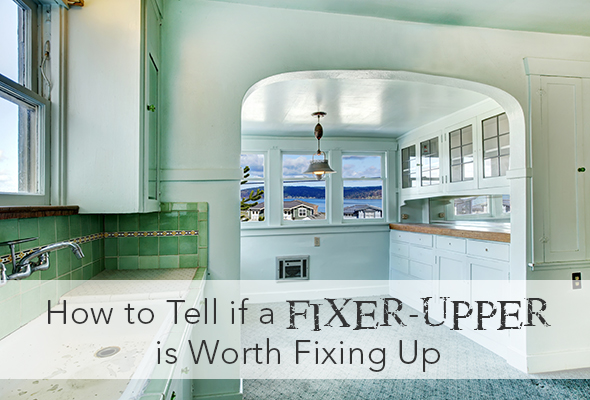
by Jeff Pittman | Nov 20, 2014 | Buyers
Buying a fixer-upper can be a great real estate investment but the secret is finding the right house. There are obvious benefits to buying a fixer-upper including: lower sales price, less competition, resale potential and the satisfaction of a job well done.We all know that the ideal fixer-upper is one that everybody wants – just not yet. The key is seeing past the peeling paint, warn carpets and popcorn stucco walls that other buyers can’t. To help you narrow in on exactly what else makes a fixer-upper a worthy real estate cause, here’s the most important points to consider. Cosmetic Repairs Vs. Structural Repairs The most important determining factor in whether or not a fixer-upper is worth the work is the type of repairs it needs. Generally speaking, cosmetic repairs cost much less and are easier to complete than structural, electrical or plumbing repairs. Cosmetic repairs simply take time and commitment. If you have the patience and determination to make your fixer-upper look better, you stand to gain from the purchase. Here’s a quick list of pricey repairs to avoid (or keep to a minimum): Replacing HVAC systems Foundation work Reroofing Large scale plumbing, sewer and electrical replacements Pouring concrete Complete remodels in the kitchen & bathroom Room additions How Much Do The Repairs Cost? If a repair costs more than it adds to the resale price, than it might not be worth it. When you’re viewing homes, make a list of repairs and consider the price of those repairs closely. Traditionally it’s the cosmetic improvements like paint touchups, floor refinishing, windows, siding and new lighting that are the most lucrative...

by Jeff Pittman | Nov 19, 2014 | Buyers
Even though many millennials are now renting, buying a single-family home in the suburbs is still important to them.

by Jeff Pittman | Oct 14, 2014 | Buyers
The home-buying process may be longer this year, and buyers may be up against multiple offers, but their long-term optimism about home prices in their new neighborhoods has gone up, up, up!

by Jeff Pittman | Sep 30, 2014 | Buyers, Sellers
The escrow process, also known as closing, is one of the most complicated pieces of real estate puzzle because there are several moving parts and quite a bit of paperwork to get in order. The process begins once seller signs the purchase agreement and ends when the buyer gets the keys to their new home. Escrow ensures that the entire process runs smoothly from start to finish. You’ve probably heard the word escrow used in phrases such as “the house fell out of escrow”, or “we’re waiting for escrow to close.” So the first question is, what is an escrow? What is escrow? Simply stated, escrow is the involvement of an impartial third party in a real estate transaction. This neutral third party acts as an intermediary between the buyer and seller, and also collects and remits funds as instructed. Buyer’s funds are deposited with the escrow company, which then remits to the seller on the buyer’s behalf. The escrow is essentially an independent neutral account and the vehicle by which the mutual instructions of all parties are complied with. The basic concept is to ensure that both the buyer and the seller are protected during any real property transaction. How does the escrow process work? The escrow is a depository for all monies, instructions, and documents necessary for the purchase of your home. These include your funds for down payment, your lender’s funds, and documents for the new loan. Generally, the Buyer deposits a down payment with the Escrow Holder, and the Seller deposits the deed and any other necessary papers with the Escrow Holder. Prior to close...

by Jeff Pittman | Sep 25, 2014 | Buyers, Investors
Owning real estate can be a great way to diversify your portfolio, or make extra income in retirement. However, managing more than one property can be time consuming. How can you manage multiple properties in an organized manner that keeps tenants happy and your wallet full? Keep these tips in mind as you get deeper into the real estate game. 1. Hire a Property Management Firm A property management company will take care of maintenance requests, collect rent, and ensure that properties are up to code and complying with all other state or local laws. While a property manager will charge a fee, he or she can keep an eye on your properties wherever they happen to be. Check out First Team Property Management to learn more about services offered and the benefits of working with a third party management firm. 2. Don’t Spread Yourself Too Thin If you don’t want to hire and pay a property manager, you can easily keep an eye on properties if you buy local. This allows you to personally stop by if tenants have an issue, or have maintenance requests handled by professionals whom you trust. By staying in your local area, you also have a better idea of where to buy, and who will rent your properties in those areas. 3. Ask Your Tenants to Help Keep Up Their Rental Space A tenant who is willing to do yard work, make repairs, or keep a swimming pool maintained can be valuable to a landlord who owns multiple properties. These tenants are the ones who are most likely to live in a property long-term, and...
by Jeff Pittman | Sep 24, 2014 | Buyers
There are so many benefits of hiring a Realtor. What else can a Realtor do for...






